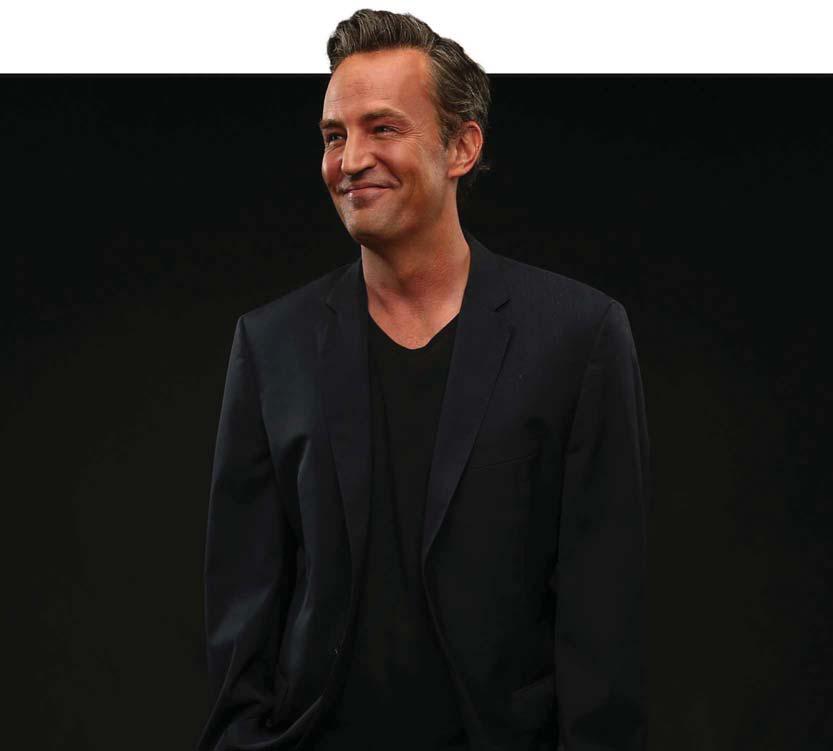
When the news broke of the tragic passing on 28 October of the comedy actor, and everyone’s sarcastic favourite in Friends, Matthew Perry (right), the tributes didn’t focus solely on his talents for making people laugh. Featured prominently in the obituaries were his struggles with mental health and addictions to alcohol and painkillers, something the man himself would undoubtedly have approved of given his openness on the subject.
Perry wasn’t unique in this. Many comedy icons – Robin Williams and Spike Milligan spring most easily to mind – are well known for their mental health struggles.
Such talents lend themselves to the ‘tears of a clown’ cliché, a concept best illustrated by the old punchline delivered when a depressed patient goes to see a doctor. The physician advises them to go and see the famous clown Pagliacci to lighten their spirits, only for the patient to burst into tears and reply: “But Doctor, I am Pagliacci.”
Why would people so gifted at making others laugh be prone to struggle with their own happiness? Some surprisingly logical explanations can be offered by the workings of the human brain.
Humans are extremely social creatures: our brains experience pleasure when others approve of us, and pain if we’re rejected socially. A low social status is reliably linked to mental health issues, like depression and anxiety.
Esta historia es de la edición December 2023 de BBC Science Focus.
Comience su prueba gratuita de Magzter GOLD de 7 días para acceder a miles de historias premium seleccionadas y a más de 9,000 revistas y periódicos.
Ya eres suscriptor ? Conectar
Esta historia es de la edición December 2023 de BBC Science Focus.
Comience su prueba gratuita de Magzter GOLD de 7 días para acceder a miles de historias premium seleccionadas y a más de 9,000 revistas y periódicos.
Ya eres suscriptor? Conectar

WHEN'S THE BEST TIME FOR A CAFFEINE HIT?
Wakey-wakey! Find the sweet spot for a coffee shot and science says the benefits are grande

DEAD MAN’S FINGERS
Picture the scene. It's Halloween and you've gone for an ill-advised stroll through the graveyard on the edge of town.

What tipping point are climate scientists most worried about?
Collapsing ice sheets, loss of the Amazon rainforest, melting permafrost.……. Key parts of Earth's climate system are in trouble. Which could trigger disaster first?

PROFESSOR BRIAN COX
The biggest space missions yet are making their way to new parts of the Universe. In his new BBC Two series Solar System, Prof Brian Cox reveals what these explorations are discovering about life in our galactic neighbourhood. Noa Leach sat down with him to talk about the most exciting new missions, life in the Universe and his top behind-the-scenes moments of filming

KEEP YOUR HAIR ON
MORE THAN HALF OF MEN AND MILLIONS OF WOMEN ARE AFFECTED BY HAIR LOSS. IT CAUSES LOW SELF-ESTEEM IN SOME AND ANXIETY IN OTHERS. THANKFULLY, SCIENTISTS AROUND THE WORLD ARE GETTING TO THE ROOTS OF THE PROBLEM WITH PIONEERING NEW TREATMENTS

DAMAGE ASSESSMENT
Could we deflect an asteroid to stop it from hitting Earth? The success of NASA's DART mission suggests so, but only after ESA's soon-to-launch Hera mission has checked the results will we know if this approach to planetary defence is a viable possibility

SAVE THE SHARKS...SAVE THE OCEANS
RUTHLESS PREDATORS, MINDLESS KILLERS, MAN-EATERS... SHARKS HAVE A FEARSOME REPUTATION THAT BEARS LITTLE RELATION TO REALITY. THE TRUTH IS, THESE REMARKABLE CREATURES ARE STRUGGLING TO SURVIVE. BUT OUR WATERS WON'T BE ANY SAFER WITHOUT THEM. IN FACT, THE PLANET'S SEAS WILL BE IN EVEN GREATER JEOPARDY THAN THEY ALREADY ARE

COULD ARTIFICIAL INTELLIGENCE BE THE CURE FOR LONELINESS?
Rates of loneliness are increasing worldwide. But big-tech companies think they have the solution...

Olive mill wastewater: a health-boosting tonic hiding in the leftovers
A by-product of the olive oil production process is packed with compounds that lower your cholesterol and reduce your risk of developing cancer.

Lab-grown meat may be better for livestock, but not necessarily for the environment
The move to put alternative protein on our plates is gathering pace but there are still questions to answer